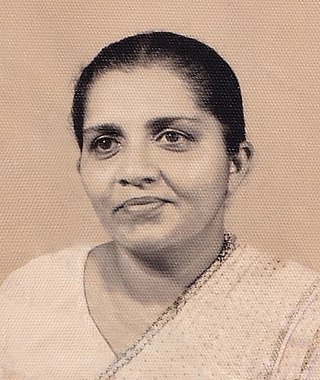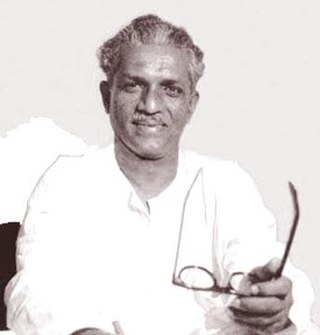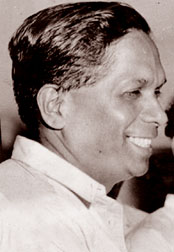Related Research Articles

Nanayakkarapathirage Martin Perera, commonly known as Dr. N. M. Perera, was one of the leaders of the Sri Lankan Trotskyist Lanka Sama Samaja Party (LSSP). He was the first Trotskyist to become a cabinet minister. He served two terms as Minister of Finance and Leader of the Opposition, as well as one term as the Mayor of Colombo.
Bolshevik–Leninist Party of India, Ceylon and Burma (BLPI) was a revolutionary Trotskyist party which campaigned for independence and socialism in South Asia. The party was formed in 1942 as a unification of two Indian groups, with the Lanka Sama Samaja Party of Ceylon. It was recognised as the Indian section of the Fourth International.

The Lanka Sama Samaja Party, often abbreviated as LSSP, is a major Trotskyist political party in Sri Lanka. It was the first political party in Sri Lanka, having been founded in 1935 by Leslie Goonewardene, N.M. Perera, Colvin R. de Silva, Philip Gunawardena and Robert Gunawardena. It currently is a member of the main ruling coalition in the government of Sri Lanka and is headed by Tissa Vitharana. The party was founded with Leninist ideals, and is classified as a party with socialist aims.
The Hartal 1953 was a country-wide demonstration of civil disobedience and strike, commonly known as a hartal, held in Ceylon on 12 August 1953. It was organized to protest against the policies and actions of the incumbent United National Party government. It was the first mass political action in Ceylon and the first major social crisis after independence. This event is of historical significance because it was the first people's struggle against an elected government in the country.

Peduru Hewage William de Silva was a 20th-century Marxist/Trotskyist Sri Lankan politician.

Indian Tamils of Sri Lanka are Tamil people of Indian origin in Sri Lanka. They are also known as Malayaga Tamilar, Hill Country Tamils, Up-Country Tamils or simply Indian Tamils. They predominantly descend from workers sent from Southern India to Sri Lanka in the 19th and 20th centuries to work in coffee, tea and rubber plantations. Some also migrated on their own as merchants and as other service providers. These Tamil speakers mostly live in the central highlands, also known as the Malayakam or Hill Country, yet others are also found in major urban areas and in the Northern Province. A majority of Hill Country Tamils are predominantly descendants from the lower working castes of South India. Although they are all termed as Tamils today, some have Telugu and Malayalee origins as well as diverse South Indian caste origins. They are instrumental in the plantation sector economy of Sri Lanka. In general, socio-economically their standard of living is below that of the national average and they are described as one of the poorest and most neglected groups in Sri Lanka. In 1964 a large percentage were repatriated to India, but left a considerable number as stateless people. By the 1990s most of these had been given Sri Lankan citizenship. Most are Hindus with a minority of Christians and Muslims amongst them. There are also a small minority followers of Buddhism among them. Politically they are supportive of trade union-based political parties that have supported most of the ruling coalitions since the 1980s.

Colvin Reginald de Silva was a Cabinet Minister of Plantation Industries and Constitutional Affairs, prominent member of parliament, Trotskyist leader and lawyer in Sri Lanka. He was one of the founders of the Lanka Sama Samaja Party – the first Marxist party in Sri Lanka.

Violet Vivienne Goonewardene, commonly known as "Vivi", was a Sri Lankan anti-colonial activist and prominent politician, serving as one of the world's first female ministers. A key figure in both the Indian independence movement and the Sri Lankan independence movement, Goonewardene was a prominent member on the non-aligned stage, where she fought against perceived injustices and was critical of the Middle East diplomacy sponsored by the United States. Goonewardene was the first and, to date, only female National Hero of Sri Lanka. By her death, she was one of the Left's most vibrant personalities, and the foremost female figure in the Sri Lankan leftist movement.
During the Donoughmore period of political experimentation (1931–48), several Sri Lanka leftist parties were formed in British colonial Ceylon. Unlike most other Sri Lankan parties, these leftist parties were noncommunal in membership.

The Sri Lankan independence movement was a peaceful political movement which was aimed at achieving independence and self-rule for the country of Sri Lanka, then British Ceylon, from the British Empire. The switch of powers was generally known as peaceful transfer of power from the British administration to Ceylon representatives, a phrase that implies considerable continuity with a colonial era that lasted 400 years. It was initiated around the turn of the 20th century and led mostly by the educated middle class. It succeeded when, on 4 February 1948, Ceylon was granted independence as the Dominion of Ceylon. Dominion status within the British Commonwealth was retained for the next 24 years until 22 May 1972 when it became a republic and was renamed the Republic of Sri Lanka.
The All Ceylon United Motor Workers Union is a trade union which organises workers in the passenger bus sector in Sri Lanka. It is affiliated to the Ceylon Federation of Labour (CFL).

Edmund Peter Samarakkody was a Ceylonese lawyer, trade unionist, politician and Member of Parliament.

Don Philip Rupasinghe Gunawardena was a Sri Lankan Marxist politician and leftist. A founder of the Lanka Sama Samaja Party, the first political party in Ceylon which was known for having introduced Trotskyism, he later formed the Mahajana Eksath Peramuna and was called 'the Father of Socialism' and as 'the Lion of Boralugoda'. A member of the State Council of Ceylon and the Parliament of Ceylon, he served as the Minister of Agriculture and food under S. W. R. D. Bandaranaike from 1956 to 1959 and as Minister of Industries and Fisheries in the national government under Dudley Senanayake from 1965 to 1970.

Sugiswara Abeywardena Wickramasinghe was the founder of the Communist Party of Sri Lanka. He was the first Leftist to be elected to Ceylon State Council in 1931. He gave up all his wealth and comforts for the sake of downtrodden. He is considered one of the leading political figures in the twentieth century of Sri Lanka.

Leslie Simon Goonewardene was a prominent Sri Lankan statesman. He founded Sri Lanka's first political party, the Lanka Sama Samaja Party, in 1935, and served as its General-Secretary from 1935 to 1977. Goonewardene was a key figure in both the Indian independence movement and the Sri Lankan independence movement. He was designated as a National Hero of Sri Lanka for his leadership in the independence movement, and his efforts are celebrated each year on the Sri Lankan Independence Day.
Vaithianathan Karalasingham was a Ceylon Tamil lawyer, writer, politician and one of the leading members of the Lanka Sama Samaja Party.
Weerahennedige Theodore Wilfred Meryl Fernando was a Ceylonese teacher, trade unionist, politician and Member of Parliament.

Sebastian Cyril Constantine Anthony Pillai, also spelled S.C.C. Anthonypillai, was a Ceylonese-Indian trade unionist, politician and Member of Parliament.
Merengna Gaulius Mendis was a Sri Lankan trade unionist and a member of the Parliament of Sri Lanka.
Communism in Sri Lanka dates back to 1935, when the Lanka Sama Samaja Party was founded by Trotskyists who campaigned for freedom and independence of Sri Lanka which was then a colony of the British Empire and known as Ceylon.
References
- Batty Weerakoon, The Ceylon Federation of Labour & the Trade Union Movement in Sri Lanka (1932-1975), (abridged version) accessed on 4 November 2005.
- Leslie Goonewardene, Short History of the Lanka Sama Samaja Party Archived 2006-10-31 at the Wayback Machine accessed 4 November 2005.
- Colvin R. de Silva, Hartal! accessed 4 November 2005.
- James Jupp, Sri Lanka — Third World Democracy, Frank Cass, London, 1978.